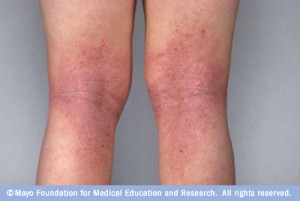-
Health & Wellness
Tuesday Q and A: Treatments and self-care can help ease eczema discomfort
DEAR MAYO CLINIC: My 10-year-old daughter has very dry skin, and it seems to get worse when school starts. She develops red, itchy patches on her arms and lower legs. They usually fade away after a while, but they really bother her. What could be the cause? Should we be using lotion on these areas, or something stronger? At what point should she be seen by a dermatologist?
ANSWER: From your description, it sounds like your daughter may have a skin condition called eczema. In children, it often flares up when they go back to school in the fall. To find out if it is eczema, make an appointment with her primary care provider or a dermatologist to have her symptoms evaluated. A number of treatments and self-care steps can help ease the discomfort.
Eczema, also called atopic dermatitis, is common in children. Symptoms typically include dry, scaly skin with red patches that may weep. In many cases, the itching caused by eczema can be severe. Eczema symptoms tend to come and go.
Many children who have eczema see their symptoms get worse in the fall. That may happen for a couple of reasons. First, the dry indoor air of most schools can cause skin to become very dry, especially when weather gets cooler and the heat comes on. Second, stress often can lead to eczema flares. When kids go back to school, they may feel more stress and anxiety than they did during the summer, and that may cause a spike in their symptoms.
A primary care provider or a dermatologist should be able to tell if your daughter’s condition is eczema simply by examining her skin. In most cases, lab tests and skin tests are not needed. A number of over-the-counter and prescription medications are available that can relieve the itching and repair skin damage. Ask the doctor which ones are right for your daughter.
Encourage your daughter to use the following sensitive-skincare steps, too. Soak in a warm bath or shower every day for about 15 minutes. When you get out, gently pat dry with a soft towel. Do not rub your skin. After you have dried off, apply any recommended medication and then cover it with a skin moisturizer. Use only shampoo, soap, moisturizer and other skin products that are hypoallergenic. They should not contain any dyes or perfumes.
Wear layers of clothing. Then if you get too warm, you can take off a layer and not become overheated. Sweating can make eczema symptoms worse, especially if sweat is left to dry on the skin. Avoid wearing tight, rough clothing or fabrics that irritate your skin.
Try not to scratch your skin. Scratching can increase your symptoms and may lead to an infection. If the itching becomes hard to bear, cover the area with cool, wet compresses. Taking a warm bath with baking soda or uncooked oatmeal in the water can ease itching, too.
As much as possible, make your daughter’s environment friendly to her skin. For example, use a humidifier to add moisture to the air in your home. Make her surroundings smoke-free, and keep her out of places where she may be exposed to secondhand smoke.
Talk to your daughter’s doctor about other ways to help relieve her symptoms. Although there is no cure for eczema, it often can be effectively managed so symptoms are less bothersome and easier to control. — Dawn Davis, M.D., Dermatology, Mayo Clinic, Rochester, Minn.
Related Articles







